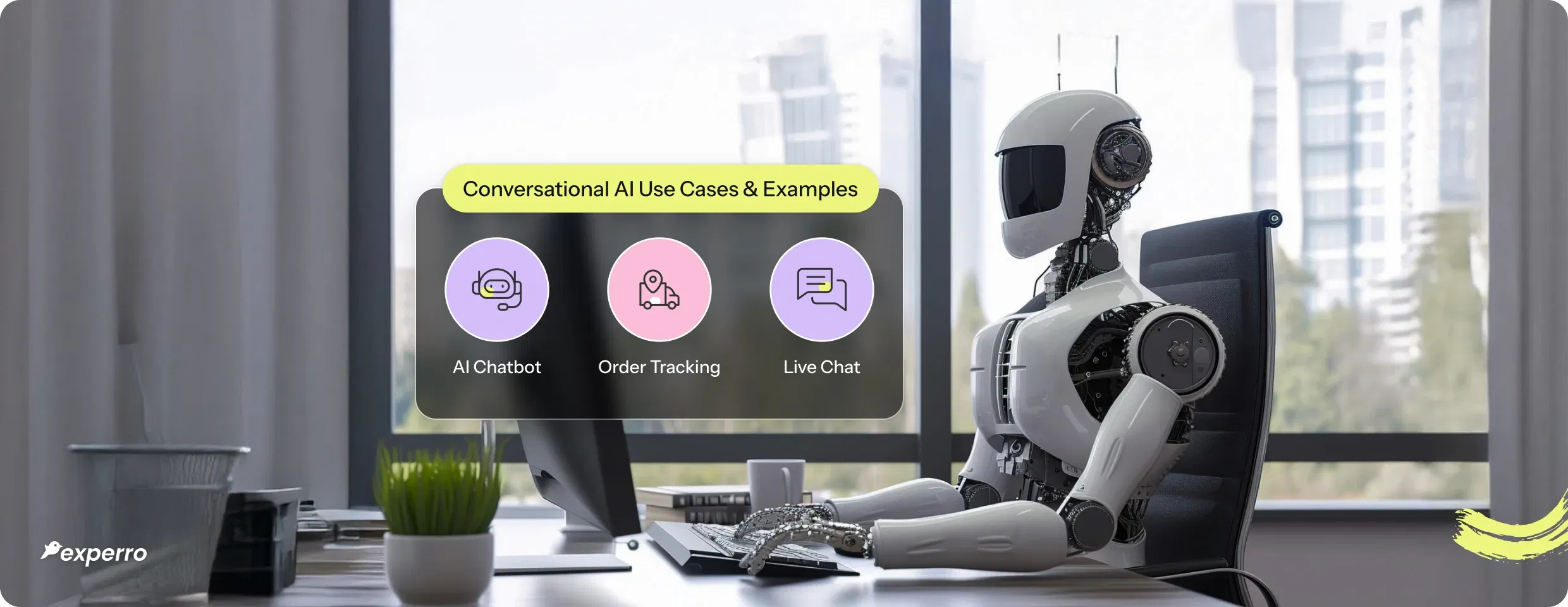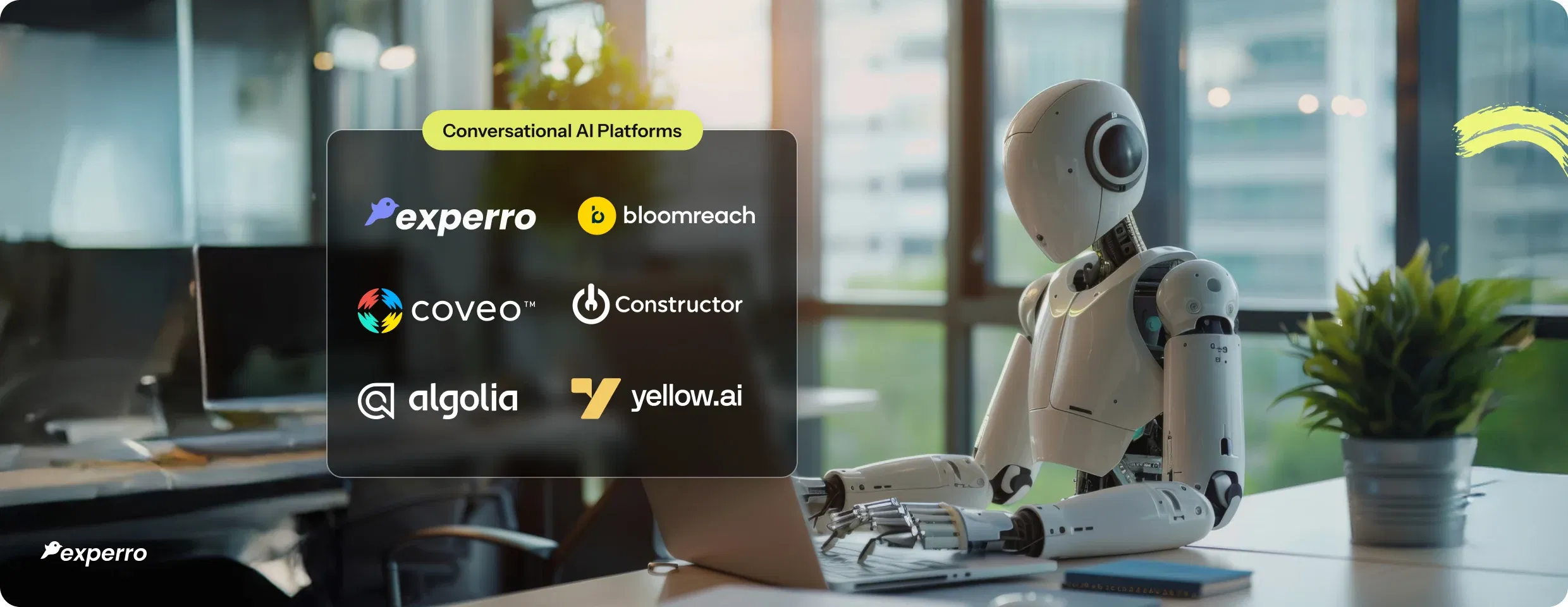- Blog
- Agentic Experience
- 15 min read
How Do Agentic Frameworks Empower AI Agents?
Published
30 May 2025Updated
2 September 2025

Core Insights Box
- Agentic frameworks are AI systems that make decisions and take actions on their own
- They use real-time user intent to guide personalized, goal-driven actions.
- Such frameworks adapt quickly, scale better, and outperform traditional AI models, delivering smarter, more tailored user experiences.
- Experro uses agentic principles to power intelligent search and personalization.
Paul van der Boor, VP of AI at Prosus predicts - “The buyers will replace scrolling through pages of products with simply telling the AI what they’re looking for.”
This signals a shift in how we interact with digital systems and agentic AI frameworks are at the heart of it.
Unlike traditional models that rely heavily on scripted responses, the agentic AI framework simulates human-like judgment and action. AI agents empower businesses to deliver adaptive and personalized experiences at a scale.
Whether you’re new to the concept or exploring the top AI agent frameworks for your tech stack, this guide will walk you through everything you need to know—from core principles to benefits and top tools in 2025.
What Is an Agentic Framework?
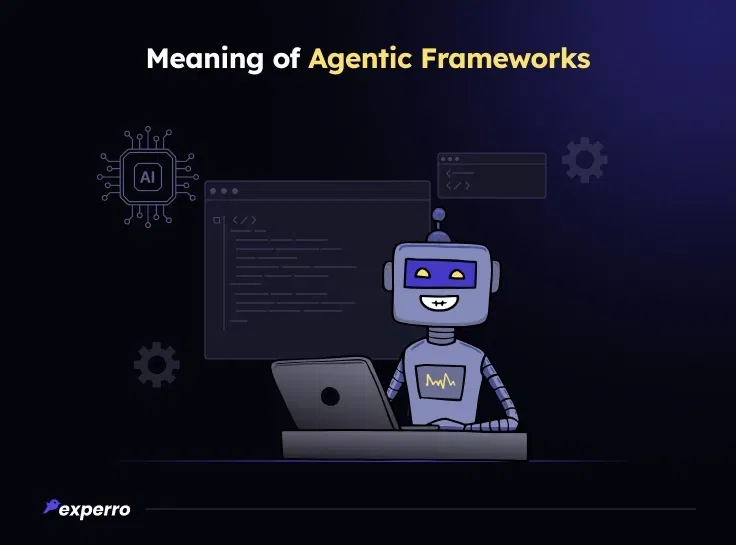
Agentic frameworks refer to AI system design and foundation where agents operate with a sense of autonomy, purpose, and decision-making ability driven by goals rather than just commands or inputs.
These frameworks structure AI in a way that allows it to:
- Perceive its environment
- Reason about its goals
- Act independently to achieve outcomes
- Adapt based on feedback or new data.
Whether you're working on a multi-agentic framework, an agentic RAG framework, or looking for beginner-friendly agentic AI framework options, understanding the basics is crucial.
A report says, 62% of U.S. firms anticipate over 100% ROI from agentic AI systems, with an average expected return of 171%.
This optimism stems from agentic systems’ ability to automate complex decision-making, enhance customer experiences, and operate autonomously, reducing manual effort while driving scalable impact.
Now, let's jump into the key features of a robust agentic AI framework in the next section.
What Are the Key Features of an Agentic Framework?
To truly appreciate the potential of agentic frameworks, it's essential to understand the architectural traits that set them apart. From dynamic goal pursuit to real-time adaptation, these key features define the agentic framework architecture.
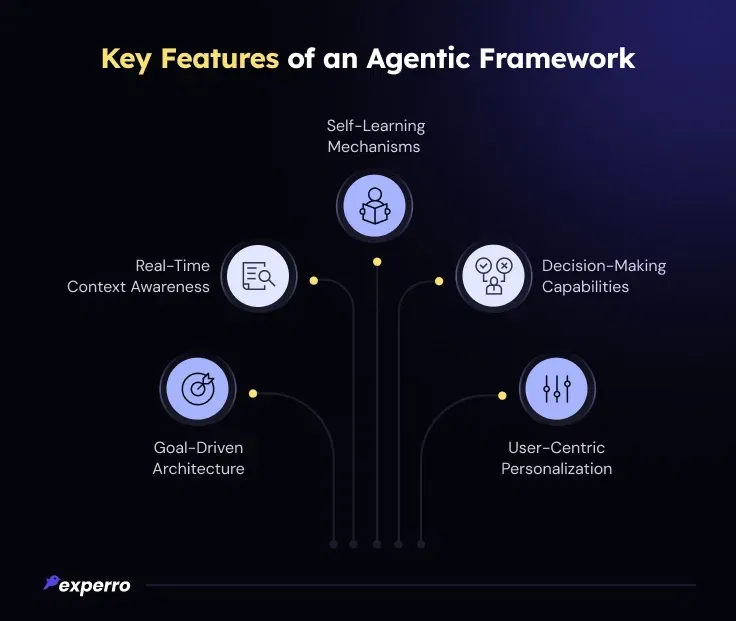
1. Goal-Driven Architecture
A goal-driven architecture lies at the top of any effective agentic AI framework. It enables AI agents to operate based on clearly defined objectives rather than just reacting to inputs.
This approach mimics human behavior, where actions are aligned with desired outcomes. With decision-making in AI becoming more complex, a goal-based model ensures that agents consistently work toward long-term success rather than short-term outputs.
Whether you're using an openAI agentic framework or large language models for agentic framework, this feature allows for continuous strategic alignment.
2. Real-Time Context Awareness
One of the standout features of agentic frameworks is their ability to adapt based on real-time environmental inputs.
Unlike legacy systems, agentic framework AI constantly changes based on updated context, enabling a far more responsive and situationally aware experience.
The framework allows agents to interpret evolving user behavior and generate highly personalized, situationally aware responses.
3. Self-Learning Mechanisms
A robust agentic workflow framework incorporates self-learning mechanisms to evolve through every interaction. These mechanisms allow the agent to identify patterns, learn from outcomes, and improve over time without manual intervention.
This element makes AI agent development frameworks not only scalable but sustainable. It transforms basic automation into strategic enablement.
It also enhances the agent runtime environments by reducing reliance on static rules and boosting autonomy through experiential learning.
4. Decision-Making Capabilities
Decision-making isn't just about choosing between A or B. An advanced agent framework involves evaluating complex scenarios, predicting outcomes, and optimizing actions. This is where generative agents shine.
With embedded logic and behavioral modeling, these agents simulate human decision-making processes.
5. User-Centric Personalization
Finally, one of the most impactful features of agentic frameworks lies in how they enable the underlying logic and infrastructure for agents to deliver user centric personalization at scale.
They go beyond surface-level customization by understanding user intent, behavior, and preferences over time.
The best agentic framework 2025 prioritizes user experience as a core feature.
Now, let's learn more about the core principles of the agentic AI framework.
What Are the Core Principles of an Agentic Framework?
To build advanced agentic systems, you need more than just features—you need guiding principles. These core principles shape how an agentic AI framework behaves, learns, and evolves.
They ensure agents act with purpose, respond responsibly, and remain aligned with user goals and ethics.
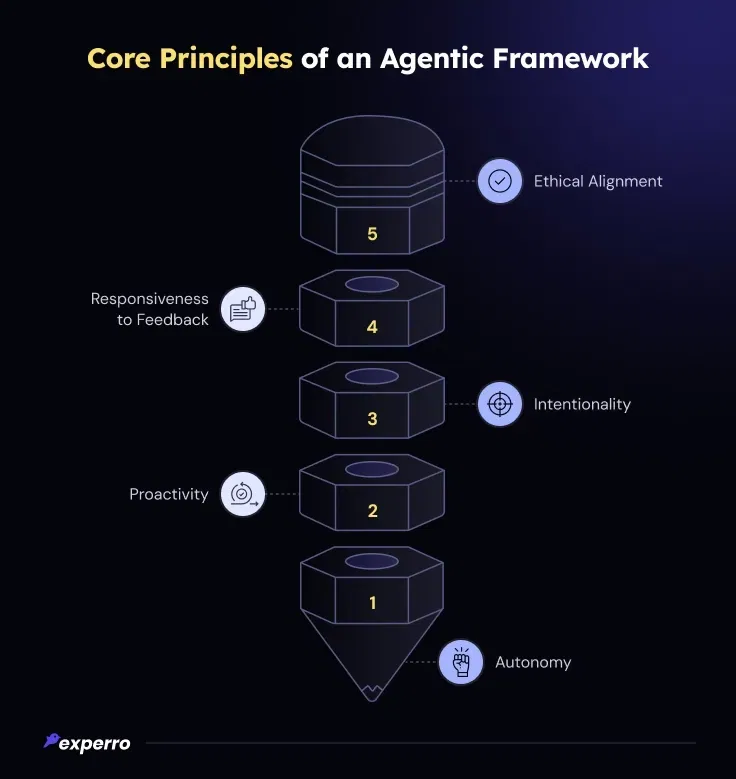
Whether you're adopting a framework for agentic AI or evaluating the best agentic framework, understanding these principles is essential for both implementation and trust.
1. Autonomy
Autonomy is the foundational principle behind every agentic framework definition. It enables agents to operate independently without constant supervision or input.
For instance, in an agentic framework LLM setup, autonomy lets the agent select and prompt the right tools or actions without human instruction.
It's what makes an AI "agentic" rather than passive, paving the way for self-reliant and adaptive behavior across applications.
2. Proactivity
A defining trait of agentic frameworks is that they don't wait to be told what to do—they anticipate needs.
Proactivity means identifying opportunities, risks, or next steps before the user does.
This is where gen AI agentic framework applications shine, especially in customer service or eCommerce, where anticipating user needs can help optimize conversion rate.
3. Intentionality
Intentionality distinguishes a truly agentic AI framework from simple automation.
It means every action taken by the agent is aligned with a specific objective.
Intentionality also supports agentic workflow frameworks by ensuring that each task within a process is logically connected to the final goal, not just a random sequence of steps.
4. Responsiveness to Feedback
Learning from outcomes is what makes a system evolve. The latest AI agent framework must respond to feedback, both from users and from its environment. This principle is vital for continuous optimization and refinement.
In platforms with agent orchestration frameworks, responsiveness ensures that agents can pivot their approach based on changing data or poor performance.
It also fuels agentic AI framework tools by enabling real-time learning loops and performance tuning, making your AI more accurate over time.
5. Ethical Alignment
Perhaps the most critical principle is ethical alignment. An agentic AI security framework must be built with safeguards to ensure responsible behavior, data privacy, and bias mitigation.
In high-stakes industries, agents must operate under clear ethical boundaries. When evaluating top AI agent frameworks or designing comparisons for enterprise use, developers should always prioritize ethics. It's not just about compliance, it’s about trust.
After understanding the foundational principles, the next logical step is to explore the landscape of available technologies.
Let's look at some of the most popular agentic frameworks that are redefining intelligent automation today.
Looking for the Best AI Agent Frameworks for your AI-based agents? Search is over!
What Are the Types of Agentic Frameworks?
Not all agentic frameworks are built the same way. Some focus on developer flexibility, others on multi-agent collaboration or seamless LLM integration.
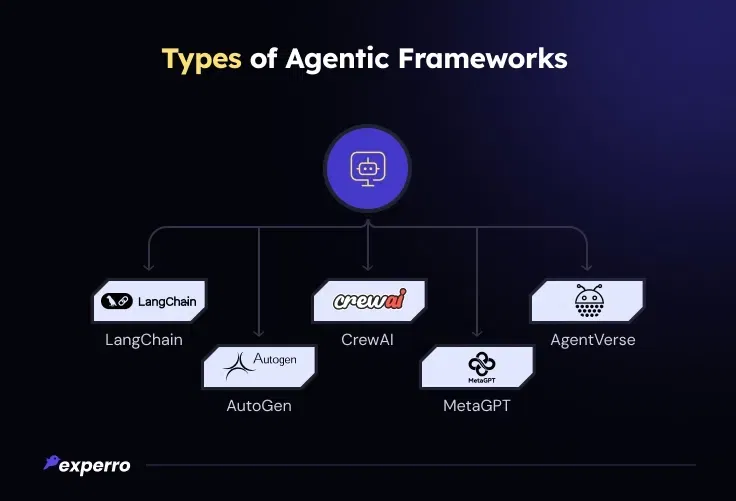
Here’s a look at the agentic framework examples that shape the future of autonomous AI systems and help organizations build advanced agentic systems with agility.
1. LangChain
The LangChain agentic framework is a popular choice for building LLM-powered agents. It provides a robust architecture to link language models with tools, APIs, and memory components.
Ideal for creating dynamic workflows, LangChain shines in LLM integration and multi-agent coordination. It’s widely used in building question-answering bots, summarization tools, and decision-support agents.
2. AutoGen (by Microsoft)
The Microsoft agentic framework, AutoGen, is designed for multi-agent conversations. It enables agents to collaborate with each other and with humans in a conversational loop.
AutoGen simplifies agentic workflow framework design by using a structured messaging format. It’s especially strong in research, task decomposition, and co-agent communication patterns.
3. CrewAI
The CrewAI agentic framework is built for orchestrating multiple AI agents that perform specialized roles. Think of it as assigning different tasks to each team member—some write, some research, while others validate.
It’s highly effective in content creation pipelines, marketing automation, and decision support. CrewAI supports no-code/low-code support for agentic flow design, making it beginner-friendly for non-engineers.
4. MetaGPT
MetaGPT is a multi-agentic framework that treats AI agents like members of a software engineering team. Each agent takes on a specific persona, like product manager, engineer, tester, helping simulate real-world software development processes.
It's useful for building developer-focused Gen AI applications, streamlining app development with minimal manual coding.
5. AgentVerse
AgentVerse is an open-source agent orchestration framework built to experiment with collaborative agents. Its modular design supports rapid prototyping of autonomous workflows.
It’s used widely in academia and by startups for testing agentic AI framework tools before enterprise-scale deployment. Great for researchers or innovators looking for the best open source agentic framework.
With a clear view of the tools available, it’s important to understand how agentic frameworks fundamentally differ from legacy AI models. This comparison helps you assess the value of upgrading to a modern, goal-driven AI agent framework.
Agentic Framework vs Legacy AI Models – Differences!
Let’s break it down with a clear comparison that highlights why agentic AI framework tools are becoming the preferred choice for building intelligent systems.
| Feature | Legacy AI Models | Agentic Frameworks |
|---|---|---|
| Goal Orientation | Reactive, task-based | Proactive, goal-driven |
| Adaptability | Low | High, thanks to self-learning |
| User Interaction | One-way or limited | Continuous, feedback-driven |
| Decision-Making | Predefined rules | Autonomous and contextual |
| Personalization | Generic responses | Real-time, behavior-aware |
| Architecture Flexibility | Monolithic | Modular and agent-based |
| Scalability | Limited | Built for scalable orchestration |
| Ethical Governance | Hardcoded rules | Built-in ethical alignment mechanisms |
After the agentic framework comparison with the legacy systems, check out some benefits of using agentic AI frameworks in the section below.
What Are the Benefits of Using an Agentic Framework Today?
Exploring the AI agent statistics will help you understand that the benefits of agentic frameworks can revolutionize how AI systems interact with customers and data.
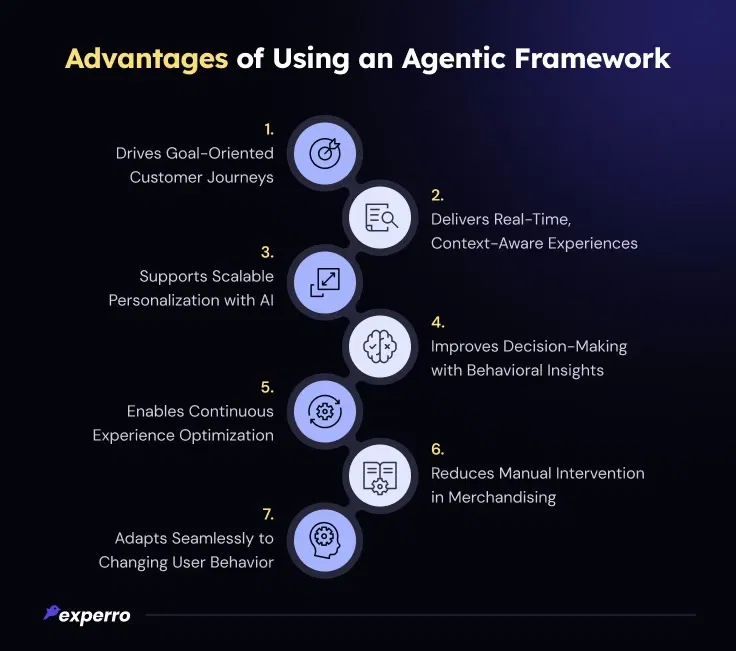
From retail to enterprise, here’s how a top AI agent framework adds real value:
1. Drives Goal-Oriented Customer Journeys
Unlike basic automation, an agentic AI framework actively works toward achieving user-defined goals. This helps create fluid customer journey orchestration from search to checkout to post-purchase support.
Instead of managing isolated tasks, these frameworks align all operational behaviors with long-term objectives. It ensures users feel guided and supported across every phase of their interaction, leading to better engagement and outcomes.
2. Delivers Real-Time, Context-Aware Experiences
Real-time context awareness is a hallmark of gen AI agentic framework architecture. Agents assess the user’s current state, environment, and preferences to deliver responses or actions that feel personalized.
They operate with a deep understanding of both static and dynamic data, adjusting outputs based on location, history, or device. This ensures that users always receive relevant, timely, and meaningful interactions.
3. Supports Scalable Personalization with AI
Using the best agentic framework, organizations can scale 1:1 personalization. Agents adapt their tone, behavior, and decisions based on evolving user data.
Even as audiences grow, the system intelligently delivers individualized experiences without increasing resource demands. Such an eCommerce personalization not only improves user satisfaction but also boosts conversions and loyalty.
4. Improves Decision-Making with Behavioral Insights
By integrating decision-making in AI with user behavioral and other eCommerce analytics, gen AI agentic frameworks help surface actionable insights in real time.
Teams can move beyond static dashboards and receive predictive cues that shape content, offers, or workflows instantly. This empowers faster, smarter decisions rooted in up-to-the-minute behavioral patterns.
5. Enables Continuous Experience Optimization
With agentic RAG frameworks and LLM-driven feedback loops, your AI system improves continuously. It refines its actions, rewrites underperforming content, or even suggests A/B tests without requiring developer input.
This eliminates guesswork and allows for iterative learning at scale. As more data is processed, the system becomes increasingly efficient at delivering what works with no reprogramming required!
6. Reduces Manual Intervention in Merchandising and Content Delivery
A key advantage of agentic AI framework tools is automation across personalized merchandising and campaign delivery. Content curation, product recommendations, and dynamic pricing can all be handled by intelligent agents with minimal oversight.
This reduction in manual effort means faster time-to-market, fewer errors, and higher consistency in customer-facing outputs. It also frees up human teams to focus on innovation rather than routine operations.
7. Adapts Seamlessly to Changing User Behavior
Behavioral drift is real, but AI agent development frameworks can adapt in real time. This agility ensures you don’t fall behind those evolving customer preferences. These frameworks continually learn from new patterns, adjusting tone, timing, or profile-based suggestions on the fly.
As user expectations shift, your AI remains a step ahead, ensuring relevance and satisfaction across every channel.
A report reveals that the U.S. agentic AI market is projected to reach $7.28 billion in 2025, growing at a CAGR of 41.48% toward $41.32 billion by 2030.
As we wrap up the potential, it’s important to be aware of the applications. Let's check out some use cases in the next section.
Go beyond basic automation, unlock true agentic intelligence with Experro!!
What Are the Agentic Framework Applications in eCommerce?
Now, it’s time to shift focus to the practical side of how gen AI agentic frameworks are transforming the eCommerce experience through smarter automation and personalization.
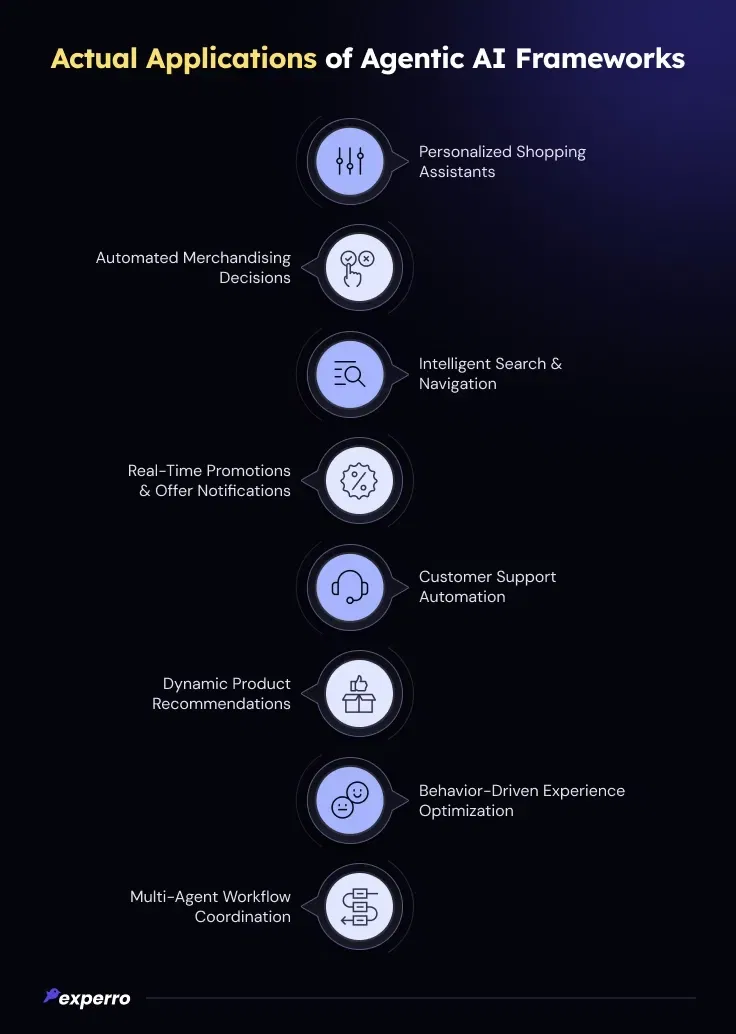
1. Personalized Shopping Assistants
Agentic frameworks enable the intelligent AI shopping assistants to provide personalized recommendations, answer queries, and guide customers through their shopping journey, enhancing user experience and satisfaction.
2. Automated Merchandising Decisions
By leveraging agentic frameworks, retailers can automate digital merchandising strategies, such as product placement and inventory management, based on real-time data and customer behavior analysis.
3. Providing Intelligent Search and Navigation
Implementing agentic AI frameworks enhances search functionality by understanding user intent and context, delivering more accurate and relevant search results, and improving navigation across the platform.
4. Real-Time Promotions & Offer Notifications
Agentic frameworks enable real-time adjustments in notifying users about promotions and offers. By responding to inventory levels and customer interactions, they help businesses align with emerging AI agent trends to optimize sales and engagement.
5. Automating Customer Support
Integrating agentic AI frameworks into customer support systems enables automated handling of inquiries, issue resolution, and personalized assistance, reducing response times and operational costs.
6. Dynamic Product Recommendations
Utilizing agentic frameworks, eCommerce platforms can provide dynamic product recommendations tailored to individual customer preferences and browsing history, increasing gen AI conversion rates.
7. Behavior-Driven Experience Optimization
Agentic AI frameworks analyze customer behavior to continuously optimize the user experience, adjusting interfaces, content, and interactions to meet evolving customer needs.
8. Multi-Agent Workflow Coordination
In complex eCommerce operations, multi-agents coordinate with various autonomous frameworks to manage tasks such as order processing, logistics, and customer service, ensuring efficiency and consistency.
Now that we are well aware of the applications as well, let’s proceed by exploring the challenges while implementing agentic frameworks in the next section.
What Are the Challenges in Implementing Agentic AI Frameworks?
While gen AI agentic frameworks promise innovation, deploying them comes with real-world complexities.
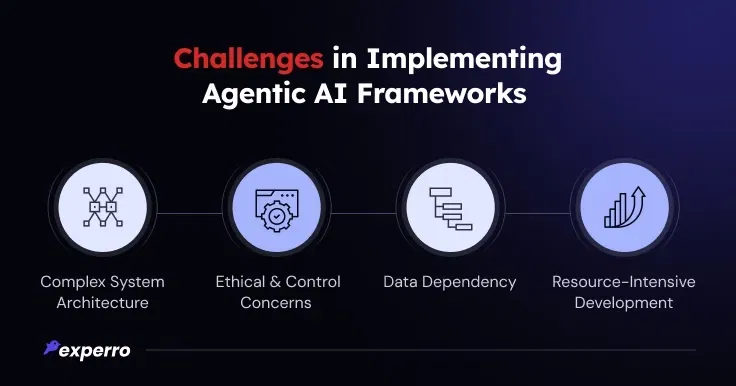
Here’s a closer look at the common obstacles and how Experro as an agentic experience platform can help you navigate them.
1. Complex System Architecture
Integrating decision engines, memory modules, and agents can create a tangled, hard-to-manage setup. Without the right structure, scaling becomes a technical burden. These interdependencies often require deep architectural planning upfront.
To address this, Experro provides a unified, composable architecture that removes integration hurdles from day one, allowing teams to launch faster with fewer dependencies.
2. Ethical and Control Concerns
With less human oversight, agent behavior can raise ethical or compliance red flags. Clear rules and accountability become vital. Misaligned outputs can damage customer trust and brand integrity.
However, Experro's AI guardrails and governance controls ensure the specialized agents operate within your brand and legal boundaries, delivering trust-driven automation at scale.
3. Data Dependency
Agents are only as smart as the data they consume - bad inputs lead to poor decisions. Data quality is non-negotiable. Even slight inaccuracies in training data can cascade into flawed experiences.
To mitigate this, Experro’s built-in data pipelines ensure clean, real-time data flow for accurate agent performance, while eliminating data silos that limit decision accuracy.
4. Resource-Intensive Development
Custom AI agent frameworks demand skilled teams, time, and a significant budget to launch and maintain. Frequent iterations can stretch timelines and budgets further.
To solve this, Experro’s low-code builder and ready-to-deploy agent templates drastically cut down development effort, empowering teams to prototype and deploy without heavy technical lift.
With an understanding of the challenges, let's dive into the checklist to tick mark while choosing the right framework for your business.
How to Choose the Right AI Agent Framework for Your E-store?
Selecting the appropriate AI agent framework for your eCommerce platform involves careful consideration of various factors:
✅Scalability: Ensure the agentic framework can handle your current and projected workload without performance degradation.
✅Integration Capabilities: The framework should seamlessly integrate with your existing systems and technologies.
✅Customization: Look for frameworks that allow customization to tailor functionalities to your specific business needs.
✅Community and Support: A strong community and support system can be invaluable for troubleshooting and continuous improvement.
✅Cost and Licensing: Evaluate the total cost of ownership, including licensing fees, development costs, and maintenance expenses.
By assessing these factors, you can identify the ideal agentic framework that aligns with your business objectives and technical requirements.
How Experro Embraces the Agentic Framework?
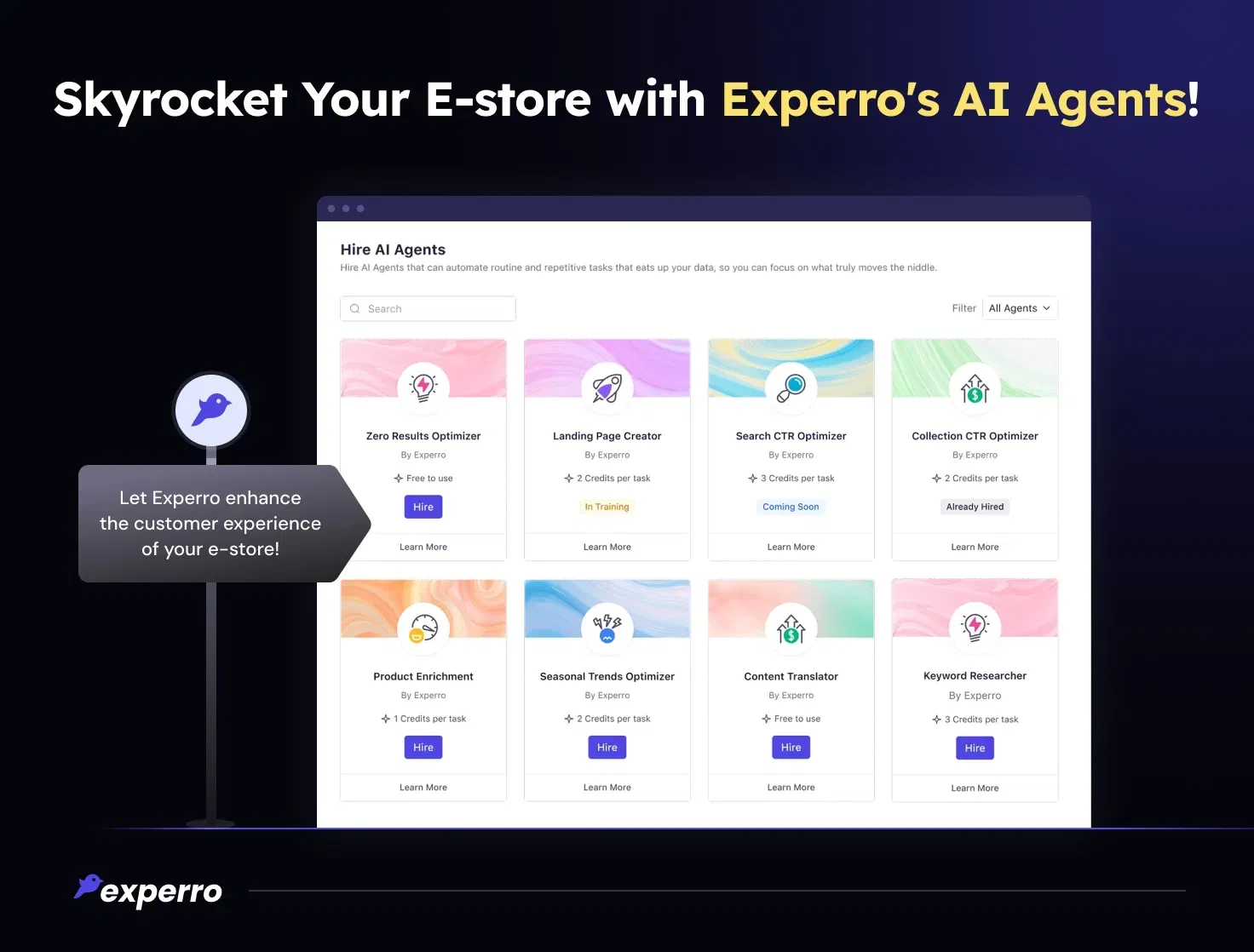
Experro embraces the agentic framework architecture by integrating backend frameworks with front-end experiences that support intelligent automation, real-time context awareness, and personalized agentic experiences.
The platform enables businesses to build agentic workflows using modular components that behave like autonomous agents which are driven by customer intent, behavior, and data signals.
Experro’s agentic capabilities include dynamic experience orchestration, behavioral targeting, and continuous optimization based on live user feedback.
This aligns with the core principles of agentic AI frameworks like autonomy, proactivity, and responsiveness, tailored for enterprise-grade eCommerce.
Beat the Competition with Experro’s Next-Gen AI Agent Framework!
Conclusion
The adoption of agentic frameworks in eCommerce represents a significant leap towards intelligent, autonomous, and personalized customer experiences.
While challenges exist in implementation, the benefits of enhanced efficiency, customer satisfaction, and operational agility make it a worthwhile investment.
As technology evolves, staying informed and adaptable will be key to leveraging the full potential of agentic AI frameworks.
Schedule a call with our experts to explore how an agentic approach can elevate your digital commerce strategy.
FAQs
What are the key features to look for in an AI agent framework?
Key features include:
- scalability
- integration capabilities
- customization options
- real-time data processing
- robust support for autonomous agents
P.S. - Ensuring these features align with your business objectives is crucial.
What is a multi-agent framework?
A collaborative multi-agent system involves multiple autonomous frameworks working to perform complex task management. This approach enhances efficiency and allows for more simplified decision-making processes.
Which AI agent framework is best for beginners?
For beginners, frameworks that offer user-friendly interfaces, comprehensive documentation, and active community support are ideal. These features facilitate easier learning and implementation of agentic AI frameworks.
What are the best agentic frameworks for enterprise use?
Enterprises should look for agentic frameworks that offer high scalability, security, and integration capabilities. Frameworks with proven track records in handling large-scale operations are preferable.
What are the pros and cons of using existing AI agent frameworks?
Here are the advantages and disadvantages of using the existing AI agent frameworks:
Pros:
- Accelerated development and deployment
- Access to established best practices
- Community support and resources
Cons:
- Potential limitations in customization
- Dependency on third-party updates and support
- Licensing and usage costs
Evaluating these factors will help in making an informed decision about adopting existing AI agent frameworks.
Pallavi Dadhich
Content Writer @ ExperroPallavi is an ambitious author recognized for her expertise in crafting compelling content across various domains. Beyond her professional pursuits, Pallavi is deeply passionate about continuous learning, often immersing herself in the latest industry trends. When not weaving words, she dedicates her time to mastering graphic design.
What's Inside
- What Is an Agentic Framework?
- What Are the Key Features of an Agentic Framework?
- What Are the Core Principles of an Agentic Framework?
- What Are the Types of Agentic Frameworks?
- Agentic Framework vs Legacy AI Models – Differences!
- What Are the Benefits of Using an Agentic Framework Today?
- What Are the Agentic Framework Applications in eCommerce?
- What Are the Challenges in Implementing Agentic AI Frameworks?
- How to Choose the Right AI Agent Framework for Your E-store?
- How Experro Embraces the Agentic Framework?
- Conclusion
Subscribe to Our Newsletter!
Get the latest insights delivered straight to your inbox.
